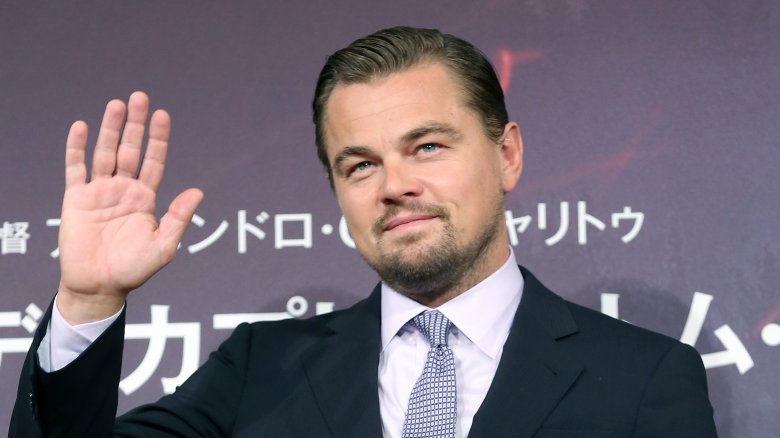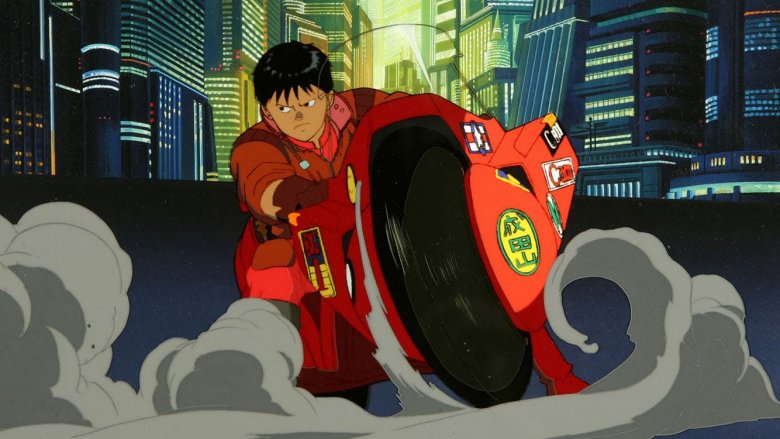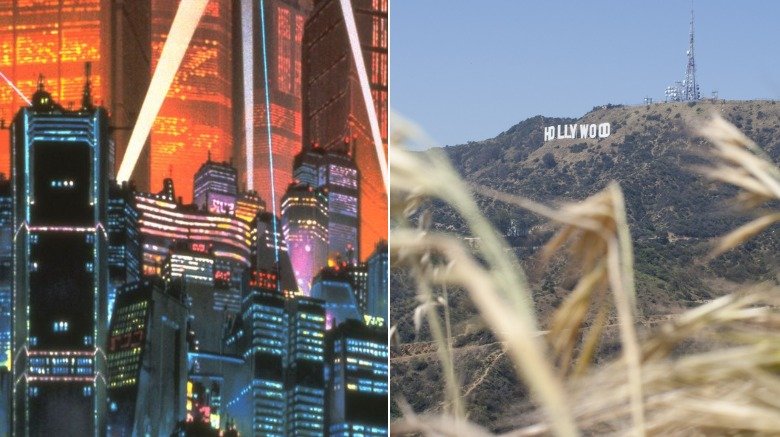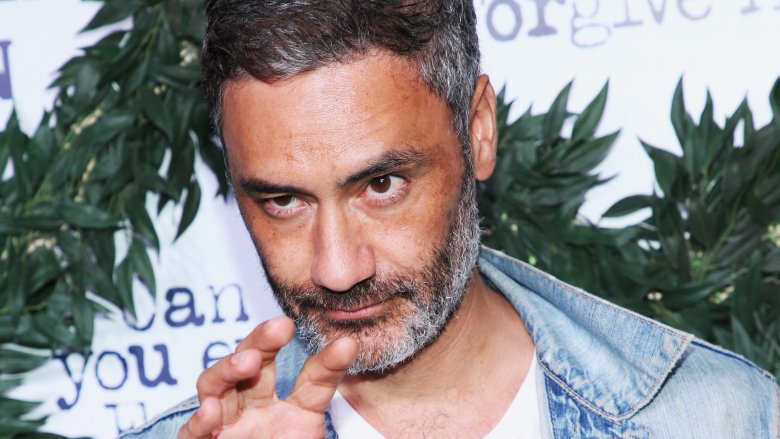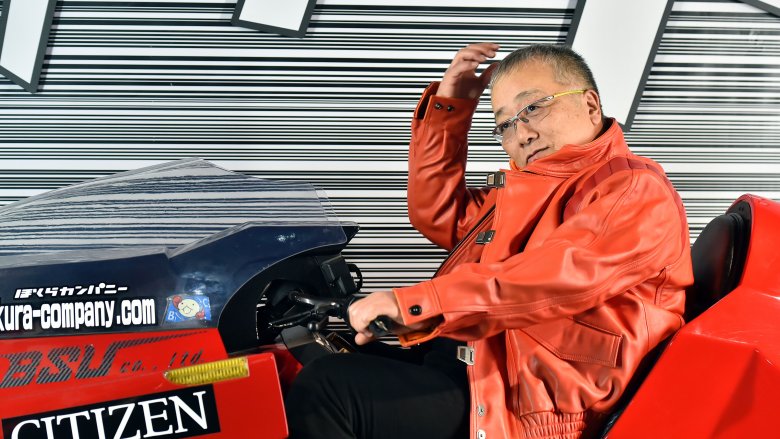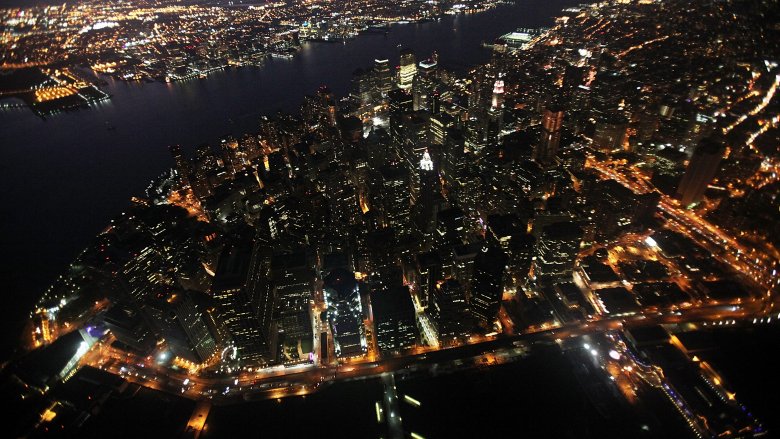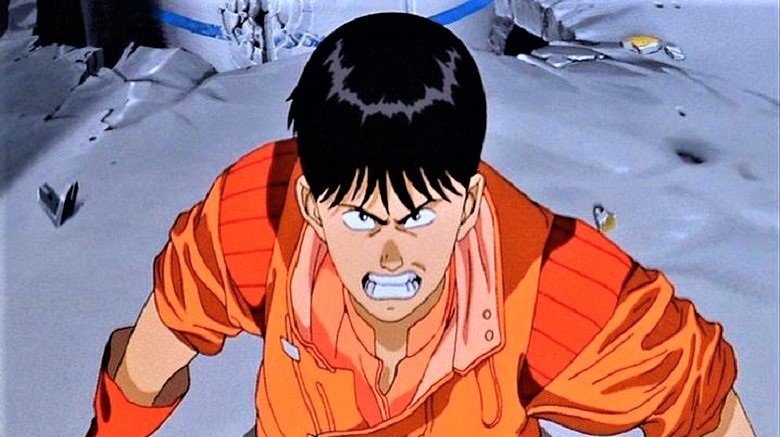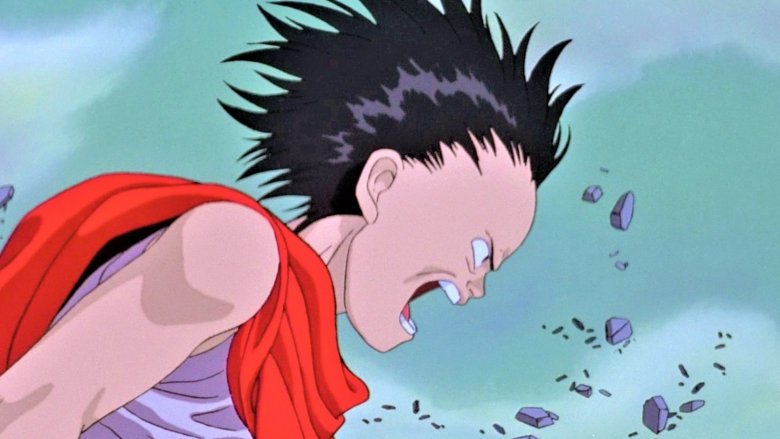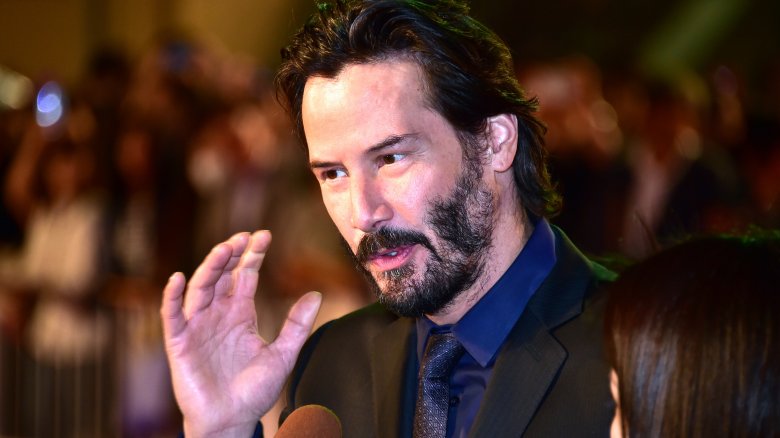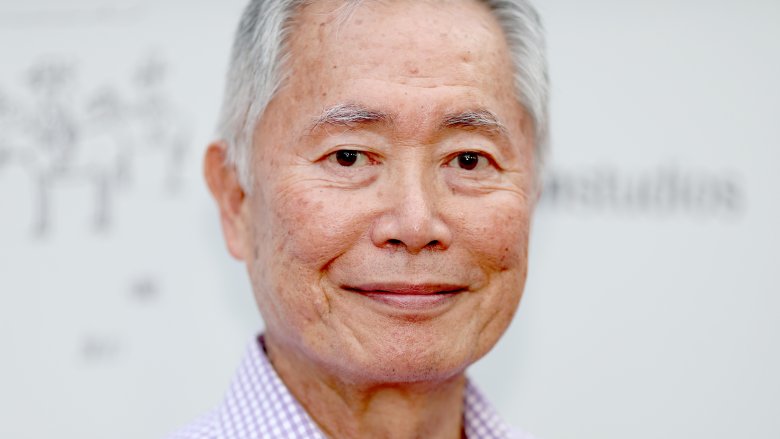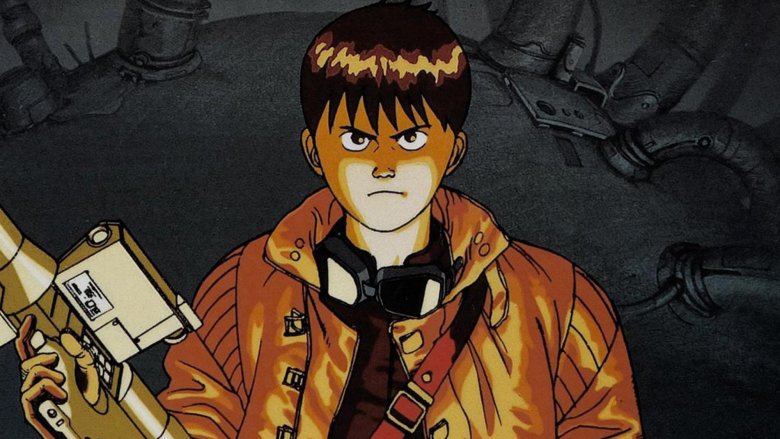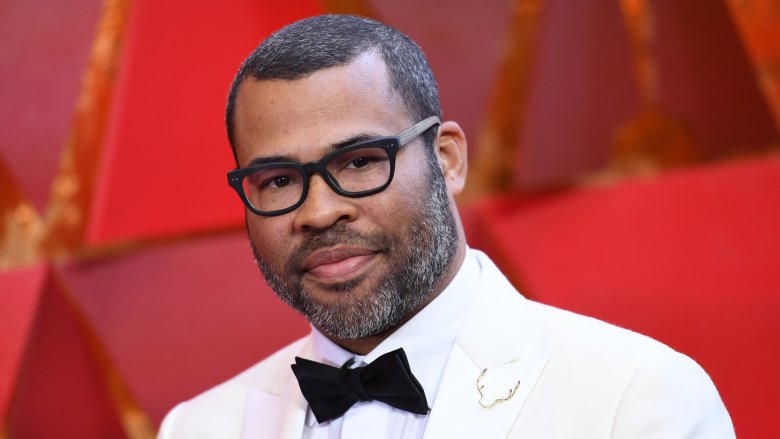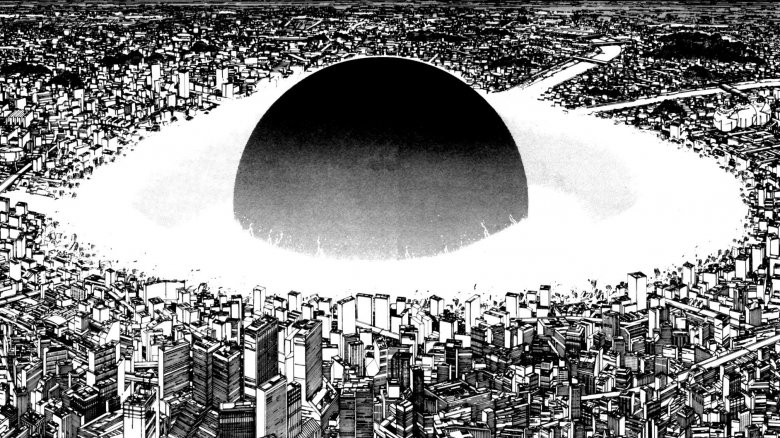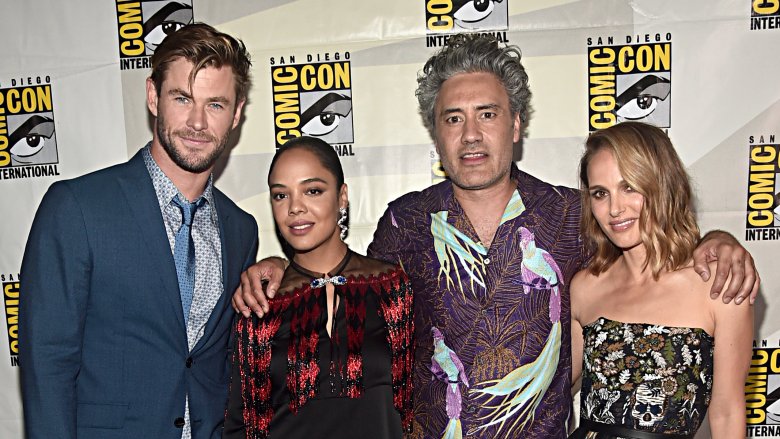The Untold Truth Of Leo DiCaprio's Akira
He's one of the world's most respected actors, but even Leonardo DiCaprio isn't completely immune to criticism, and the Oscar winner will be well aware that he's sticking his neck out by getting involved with Akira. Warner Bros. and DiCaprio's company Appian Way are officially moving forward with a live-action remake of the classic Japanese manga and anime, and while it appears as though the Inception star won't actually star in the movie, he's still putting his stellar reputation on the line by producing it. Why is this such a risky venture? That's a multifaceted question, one that we're going to tackle momentarily. But the short answer is: many have tried, and many have failed.
A Hollywood remake of Katsuhiro Otomo's Akira has been on the cards for almost two decades, though every time it gets a greenlight, the wheels somehow fall off. So why would DiCaprio's most recent incarnation be any different? Paramount had its fingers burned when it gave Ghost in the Shell (another beloved manga-turned-anime) the Tinseltown treatment in 2017, but have lessons been learned? Alita: Battle Angel certainly fared better, even if critical response was still mixed. If we're lucky, maybe Akira will truly be the Hollywood anime adaptation we've all been waiting for, but there's every chance it'll end up another high-profile failure.
From the most recent developments to the project's error-plagued history, this is the full, untold truth of Leo DiCaprio's Akira.
DiCaprio has been a big anime fan for years
When Otomo decided to adapt his hit manga series for the big screen, he couldn't have known just how big an impact the anime version would have, not only in Japan, but in the west, too. The vast majority of Americans knew nothing about anime when Akira dropped in 1988, but that was all about to change. According to Film School Rejects, bootleg copies of the film spread like wildfire across U.S. campuses, shattering the notion that animation was only for kids and creating an instant desire for more.
DiCaprio was a teenager when Akira hit the States, and it clearly made an impression on him. The actor and producer has been a big fan of anime for years now, Akira in particular. He got involved with the Hollywood remake back in 2008, when Appian Way first tried to develop it. "We're waiting for the final draft of the script," DiCaprio told MTV at the time. "I'm a big fan of Japanese anime... I know there's a lot of loyal fans out there of the project and die-hard fans, so we're going to try to do the best job we possibly can and we're not going to make the movie until the script is in the right shape."
Gary Whitta (After Earth) was the man tasked with penning the screenplay. According to Whitta, a trilogy would have probably gone ahead had the first movie been a hit.
Neo-California
DiCaprio's Akira fell through in 2008, but it had nothing to do with Whitta's script not being ready. Irish director Ruairi Robinson (who created a bonkers sizzle reel to showcase his vision for the remake) was attached at the time. He later revealed that producers put the project on the back-burner for financial reasons. "They couldn't get the budget under 200 million bucks for that draft, which was a bit rich for what was proposed as an R-rated movie with no stars," Robinson said.
For those of you unfamiliar with the plot of Akira, it takes places three decades after Tokyo is leveled by a devastating explosion. The mega city that springs up in the aftermath is Neo-Tokyo, home to the young biker gang that the story revolves around. When one of the boys begins to develop powerful psychokinetic abilities, Neo-Tokyo faces destruction all over again. It's a big-budget story, which is probably why DiCaprio and his partners at Warner Bros. decided to film the whole movie in California.
Making Akira totally in-state means the film qualifies for an $18.5 million tax credit allocation, Deadline confirmed. "The availability of top-notch crew members, plus the wide variety of location choices and predictable weather are second to none," Warner Bros.' Ravi Mehta said. Needless to say, fans of the original are worried about this move. The setting and aesthetic of Akira are central to its appeal, and recreating this in the Golden State will be no mean feat.
Akira changed Taika Waititi's life
He became one of the most sought-after filmmakers in Hollywood after 2017's Thor: Ragnarok, but Taika Waititi was already in talks to direct Akira when he started working for Marvel. The New Zealand native was asked about his approach to remaking Akira while promoting the third Thor installment, and his answer was pretty straightforward — take inspiration from the manga, with a different take than the existing animated version. One of the main issues with the Ghost in the Shell remake is that it essentially copied the anime, and this is exactly what Waititi isn't going to do.
"Who wants to see a shot-for-shot remake of the film? Nobody," Waititi told The Hollywood Reporter. "Also, you have to make it entertaining. I think it's really dangerous to make these films very serious cyber punk. There was a time and place for that and there may be a time and place for that tone again, but you have to make fresh takes on things."
Waititi sang the same tune when Dazed caught up with him in 2018, though he was still in the early stages of development even then. He knows he wants to base his live-action film on the manga, he just hasn't figured out which volumes. "I haven't really started to get my head around it yet," he said. "There are six gigantic books to go through. It's so rich. But Akira is one of my favorite films; my mum took me to see it when I was 13 and it changed my life."
The original creator has final approval
During his interview with The Hollywood Reporter, Taika Waititi reminded readers that Akira creator Katsuhiro Otomo has advised anyone who directs a live-action version to put their own unique spin on it. "Otomo said, 'Please don't copy my stuff, don't copy what I did.'" Luckily, that was never Waititi's plan. The Hunt for the Wilderpeople director always intended to go back to the manga and create a movie unlike the 1988 anime, but he still has to go through Otomo. When the Japanese artist-turned-director sat down with Forbes in 2017, he revealed that while he's happy for a new filmmaker to take Akira in a different direction, he gets final approval.
"When it comes to Akira I have already finished the original manga and my own anime version too," Otomo said. "So in that sense, I am basically done with Akira. If someone wants to do something new with Akira then I am mostly okay with that. As I accepted the offer for a live-action Akira to be made, so I am generally okay with whatever they want to do with it. However, I did give one major condition to a live-action version and that is that I had to check and approve the scenario. As always, the fundamental question on adapting anything is whether you follow the host work strictly or do something new with it."
Neo-Manhattan
Filming the movie in the States is one thing, but setting it there is another entirely. In April 2018, Production Weekly shared the first official synopsis for DiCaprio's Akira, and it made for some pretty grim reading for fans of the source material. The live-action version is making a ton of fundamental changes, including moving the action from Neo-Tokyo to Neo-Manhattan. "When a young man's telekinesis is discovered by the military, he is taken in to be turned into a super weapon and his brother nuts [sic] race to save him before Manhattan is destroyed by his powers," the synopsis reads (via CBR). "Kaneda is a bar owner in Neo-Manhattan who is stunned when his brother Tetsuo is abducted by Government agents lead by the Colonel."
If there's any city that can stand in for Tokyo, it's New York. Manhattan offers the perfect palette for this kind of story, and some fans may have been willing to forgive the filmmakers had they not decided to mess with the main characters, too. In Otomo's story, best friends Kaneda and Tetsuo are teenagers. The fact that Kaneda owns a bar in the upcoming live-action version suggests that he and Tetsuo (who is now his brother, for some reason) will be a whole lot older. Will it end up being a case of one change too many?
The early signs of whitewashing
This idea of setting the Hollywood version of Akira in a future Manhattan actually dates back to when Warner Bros. first negotiated a deal for the property in 2002. Stephen Norrington (Blade) was the first person in the hot seat, signing on to both write and direct. The filmmaker rubbed a lot of fans the wrong way when he spoke to The Hollywood Reporter about his vision for the movie, confirming that he intended to make it "more accessible" to Western audiences. Norrington told THR (via IGN) that his story "preserves the tone, the visual and the epic scope of the original whilst telling a somewhat more accessible story."
Norrington didn't explicitly state that his version would feature Western actors and be set in America, but his replacement later confirmed that some version of Neo-Manhattan has been on the cards from the very beginning. When Norrington departed the project (which, probably not coincidentally, happened after his film The League of Extraordinary Gentleman flopped) the studio turned to director Ruairi Robinson and screenwriter Gary Whitta. Speaking with Collider in 2013, Whitta revealed that Norrington did in fact intend to move the action to "New-Manhattan" and abandon the Neo-Tokyo setting altogether.
Whitta hits back at whitewashing claims
Gary Whitta also discussed his own vision for the movie during his Collider interview, and according to him, there was one crucial difference between what he had planned and what he'd inherited. Stephen Norrington's comments about making the live-action Akira "more accessible" raised a lot of eyebrows, but Whitta believed he'd found a way to get westerners on board while still remaining faithful to the source material. "The idea is that there'd been a massive economic crash in the United States and in our desperation, we sold Manhattan Island to the Japanese, who were becoming a very powerful economic force, and they were having an overpopulation problem," the Star Wars Rebels writer said. "Because Japan is a series of islands, it can only accommodate so many people."
In Whitta's Akira, Manhattan was technically foreign territory, owned and populated by the Japanese. A technicality wouldn't have been enough to make die-hard fans accept the change, but at least the cast would have been Japanese in this version, right? Probably not. "So it was Japanese territory, it wasn't New Tokyo, but there were Americans who kind of lived in little Americanized quarters of it," Whitta said. "I felt it was a way to do a kind of cool Western-Eastern fusion of the two ideas; not fully Japanese, not fully westernized." In other words, he wanted Hollywood stars in a Japanese setting.
Keanu Reeves almost starred
One of the many Hollywood stars attached to the Akira remake over the years, Keanu Reeves came very close to playing Kaneda. When the Ruairi Robinson/Gary Whitta version fell through, Warner Bros. (under the "watchful eye" of DiCaprio) hired Book of Eli co-director Albert Hughes to steady the ship and brought in Harry Potter scribe Steve Kloves to rework the script. Reeves was the main target, but despite constructive talks, the Matrix star decided to pass. As it turns out, he wasn't the first.
"The discussions were early but optimistic as Reeves seemed to have interest in the material, but we can confirm that Reeves has officially joined Brad Pitt, James Franco and Ryan Gosling as actors who've passed on starring in Akira," JoBlo revealed. "Some time after receiving word from Reeves' reps that he would be passing on the project, Warner Bros. shut down Akira's pre-viz department and most of the staff that was working on the film was let go."
The studio denied that Reeves' rejection had anything to do with the shutdown, but from the outside it certainly seemed like the straw that broke the camel's back. According to Deadline, WB had already approached Robert Pattinson, Andrew Garfield and James McAvoy about the role of Tetsuo, while Garrett Hedlund, Michael Fassbender, Chris Pine, Joaquin Phoenix, and even Justin Timberlake were contenders for Kaneda.
George Takei wasn't happy about the all-white shortlist
When fans discovered that a version of Akira starring Robert Pattinson and Justin Timberlake was a very real possibility, they lashed out. One person who was particularly vocal about the all-white shortlist of actors being courted was George Takei. Speaking with The Advocate, the Star Trek legend predicted that Warner Bros. would have another flop on its hands if it whitewashed Akira. "The idea of buying the rights to do that and in fact change it seems rather pointless," he said (via Flickering Myth). "If they're going to do that, why don't they do something original, because what they do is offend Asians, number 1; number 2, they offend the fans."
The actor used M. Night Shyamalan's live-action adaptation of "Asian influenced" animation Avatar: The Last Airbender as an example of what not to do. "He cast with non-Asians and it's an Asian story, and the film flopped. I should think that they would learn from that, but I guess big studios go by rote, and the tradition in Hollywood has always been to buy a project, change it completely and flop with it." It's been almost a decade since Takei issued his warning, yet (judging by the most recent synopsis) the message didn't sink in.
Jaume Collet-Serra insulted the source material, and Japan
Next through the revolving door was director Jaume Collet-Serra, who replaced the outgoing Albert Hughes. Collet-Serra came aboard in 2011, but it wasn't long before his reincarnated version of the project hit a brick wall. In January 2012, The Hollywood Reporter revealed that the production offices in Vancouver had been shut down. At this stage, the only actor officially involved was Garrett Hedlund (though Kristen Stewart, Ken Watanabe, and Helena Bonham Carter were said to have been "in various stages of dealmaking"), so when budget once again became an issue, the studio didn't hesitate to put Akira back on the shelf.
Collet-Serra was already working with a reduced budget of $90 million, and sources suggested that Warner Bros. wanted to drop that figure again, aiming to spend as little as $60 million. It all went quiet on the Akira front after that, but when the director spoke with Coming Soon in 2014, he confirmed that he was still trying to get a scaled-down version made. Unfortunately, he also made some incredibly ill-advised comments about Otomo's story.
"Nobody's interesting," the Spanish filmmaker said. "Tetsuo's interesting because weird s*** happens to him, and Kaneda is so two-dimensional. That's part of the Japanese culture, they never have strong characters. They're used as a way to move the other philosophy forward." These comments were quickly picked up by Comics Alliance, who couldn't understand why exactly Collet-Serra would dedicate years of his life to "a cultural literature he does not respect."
The real reason Jordan Peele turned it down
In 2015, a report from Den of Geek got fans of Christopher Nolan excited. The website's sources suggested that the Inception and Interstellar director was working on an Akira trilogy at Warner Bros., with the first installment set to drop in 2017. That at-the-time untitled Nolan project turned out to be Dunkirk, however. There's no evidence that Nolan was ever involved, but we know for sure that the studio approached both George Miller (Mad Max) and Jordan Peele (Get Out).
Miller turned the opportunity down because he was just too busy ("I've got so many things on my dance card, I don't have the time to do everything," he told Yahoo!), but what was Peele's excuse? The comedian-turned-horror helmer is a huge fan of the anime, but at this stage in his career he's only interested in original stories. "Akira is one of my favorite movies, and I think obviously the story justifies as big a budget as you can possibly dream of," the in-demand Peele told The 13th Floor. "But the real question for me is: Do I want to do pre-existing material, or do I want to do original content? At the end of the day, I want to do original stuff."
Does Akira even work outside of Japan?
Does Akira actually work in any other setting? Speaking to SlashFilm in 2018, screenwriter Gary Whitta argued that the themes are universal and therefore the setting should be interchangeable. "I personally reject the argument that Akira is necessarily a Japanese story and that it's somehow sacrilegious to set a new adaptation of it anywhere else," Whitta said. "I think many of the themes in that story are ones that speak to the human condition and are therefore relevant anywhere in the world — if that weren't true the original versions would never have been a hit outside of Japan."
A similarly themed story could indeed work anywhere, but the trouble with Akira is that it's directly inspired by the post-World War II mentality in Japan, and at its heart is about how living in the aftermath of a nuclear event can change a country. This is reflected in the "shocking nihilism of its young protagonists," as Comics Alliance put it. Hiro Murai told IndieWire that Akira is "tied to post-war Japan and ideology," and he isn't the only director to voice this opinion. According to Vice, both Stephen Spielberg and George Lucas were "offered the chance to bring Akira to the U.S. in 1987 [and] they famously turned it down, saying it wouldn't suit western audiences."
Marvel ruined the release date
In May 2019, Akira fans got some much-needed good news regarding the long-gestating live-action adaptation — Warner Bros. had finally set a release date. Taika Waititi's film (which he's reportedly co-writing with Always Be My Maybe scribe Michael Golamco) was going to hit cineplexes on May 21, 2021, the studio confirmed. There was another development soon after. In July 2019, a casting call for a project named "Box 28" appeared on industry website Backstage, and those in the know quickly figured out that it was actually for Akira.
According to the listing, producers were on the hunt for Asian males aged 18-24 to play Jun, described as "the leader of a street gang of teenagers [who] knows how to have a good time," and Koichi, who is "constantly forced to punch up in order to survive. He's fearless to the point of recklessness." The character descriptions match up with Akira co-leads Kaneda and Tetsuo. The fact that Warner Bros. is looking for race- and age-appropriate actors is indeed a good sign, but fans weren't able to stay excited for long.
A matter of weeks after the casting call appeared online, news that Waititi had agreed a deal to helm another Thor movie for Marvel broke. "[Akira] is being put on pause indefinitely as the two projects' production dates began to bump up against one another," The Hollywood Reporter confirmed. Waititi, who directed 2017's Thor: Ragnarok, remains attached, but Akira is now back in limbo.
